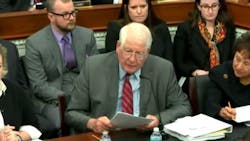Restart fix, trucker pay, safety ratings addressed in House bill
A House Appropriations subcommittee on Wednesday easily approved a bill to fund the Dept. of Transportation for the coming year, but once again the annual appropriations package contains a handful of trucking provisions that are likely to prompt lively debate as the legislation moves forward.
As for funding, the fiscal year 2017 Transportation, Housing and Urban Development (THUD) funding bill authorizes $44 billion from the Highway Trust Fund, which is $905 million above the fiscal year 2016 level. This funding mirrors the levels authorized in the FAST Act, or highway bill, approved last fall.
Subcommittee Chairman Mario Diaz-Balart (R-FL) called the majority-authored legislation “a good, responsible bill,” but Ranking Member David Price (D-NC), while generally supportive of increased funding levels, noted several “problematic policy riders” that he will seek to have removed when the bill goes to the full Appropriations committee.
Based on last year’s partisan discussion, several trucking provisions are likely on that list. The bill includes language that would restore the 34-hour restart to the rule that was in place in 2011, an attempt to fix a drafting error made in last year’s bill that creates confusion over what rule would be in effect if a mandated study doesn’t support the effectiveness of the July 2013 restart change.
The House THUD package also includes a provision designed to ensure uniform labor rules for truckers. The provision would give federal hours of service rules precedence over state wage and hour laws, preventing a “patchwork” driver pay system across the country.
Additionally, the bill bars FMCSA from going through with proposed changes to the Safe Fitness Determination rule pending the review of the Compliance, Safety, Accountability program as called for the in FAST Act.
Speaking in Little Rock Wednesday, American Trucking Assn. Chairman Pat Thomas said he was optimistic the restart correction will be made, although he noted there are no “sure deals” in Washington.
“People understand, ‘hey, we already did this once, but we made a mistake—let’s just fix it,” he said. “I think we’re going to get there.”
As for the uniform work rules, Thomas suggested passing such legislation would be “a little bit tougher” due to opposition from both California senators.
“This is huge problem that has surfaced in California, and that’s where we’re seeing most of the litigation,” he said. “But there are 29 other states that have laws similar to this that will begin to be a problem. This isn’t a one-state issue.”
Opposition stands firm
Indeed, Sen. Barbara Boxer (D-CA) has come out strongly against previous attempts to override California law and recent court decisions, calling the legislation “mean-spirited” and arguing that the provision allows companies “to dock employees’ pay when they take a meal or bathroom break.”
Such language made it into the House version of the highway bill but was removed in conference negotiation with the Senate. A provision likewise was included in the initial version of an aviation funding bill before being struck.
“It’s about more than pay,” Boxer said in February. “A truck driver who fears their pay will be docked—which will be most of them—will suffer from driver fatigue. We know that driver fatigue and distracted driving are significant causes of truck-involved accidents.
And the White House has expressed concern that the Senate’s restart fix, a 73-hour cap on a driver’s work week, “undermines safety.”
Also this week, Sen. Richard Blumenthal (D-CT) and others have submitted an amendment to the Senate THUD bill, now on the floor, that would reestablish the 2013 restart rule and its requirement for consecutive overnight off-duty periods.
The Truck Safety Coalition on Wednesday issued an “action alert” urging supporters to fight the “the trucking industry language” and replace it with the Blumenthal amendment, which is “driven by safety rather than self-interest.”
“It is time for our lawmakers to look at the facts and listen to the public,” the alert states. “Truck drivers should not be working and driving longer hours in light of hundreds of studies on the safety problems of truck drivers working and driving longer hours, and Congress should not be ignoring over 20,000 public comments to the rulemaking docket on HOS rules.
About the Author
Kevin Jones 1
Editor
Kevin has served as editor-in-chief of Trailer/Body Builders magazine since 2017—just the third editor in the magazine’s 60 years. He is also editorial director for Endeavor Business Media’s Commercial Vehicle group, which includes FleetOwner, Bulk Transporter, Refrigerated Transporter, American Trucker, and Fleet Maintenance magazines and websites.
